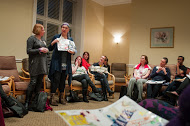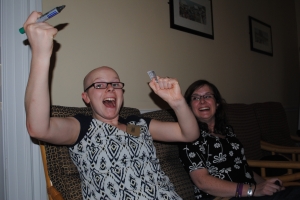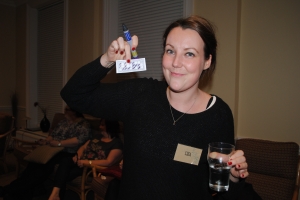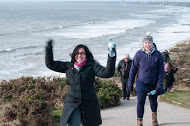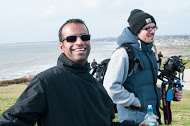At Shine, we know that life after a cancer diagnosis is never quite the same as it was before. As the only charity in the UK exclusively focused on supporting people in their 20s, 30s and 40s who are living with cancer, we want to make sure that no one in this age group feels alone – and we think it’s important that the experiences of younger adults with cancer are reflected through the work we do.
Our new blog series Life – But Not As You Knew It aims to do exactly that. Over the coming months we’ll be highlighting some of the issues that uniquely affect younger adults. In our first blog below, Christopher talks about living with a chronic form of leukaemia that usually affects people in their 70s. Part exploration of life on ‘watch & wait’, part letter of complaint, we are sure that you’ll be able to relate to some (or all!) of the issues he touches on.
If you’re interested in blogging for us, we would love to hear from you! Drop us a line at info@shinecancersupport.co.uk and we’ll get in touch.
***************************
Watching and Waiting
Guest blogger: Christopher Riley
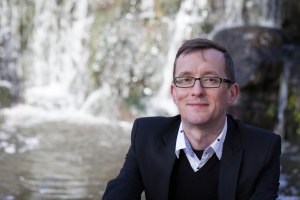
It has been a long time since I have written anything with the exception of letters of complaint (which I am now somewhat an expert at); hence, this will probably seem like one long complaint and in some ways I think it is.
I am not going to write so much about my experience of having a cancer diagnosis but more about what it is like to be on ‘watch and wait’ (W&W) and living with an invisible illness.
I was diagnosed with Chronic Lymphocytic Leukaemia (CLL) in late 2008 at the age of 40. For the first 2 years I was monitored closely to see what stage the disease was at and how quickly it was progressing. As the disease is relatively stable I am on what is called ‘watch and wait’.
Blood cancers are complex, so in a nutshell there are three factors that could mean the commencement of treatment: change to blood counts; lymph nodes becoming too enlarged; and/or repeated infection impacting on the quality of life. These are basically what the hospital is ‘watching and waiting’ for.
Treatment for CLL is initially chemotherapy, which can put the disease into remission for up to 5 years. But it will keep returning until eventually one becomes immune to the chemotherapy. After about three attempts of chemotherapy a bone marrow transplant may be considered. This is the closest you can get to a cure, but of course it is a hazardous procedure. CLL is treatable but not curable.
The median age for someone to be diagnosed with CLL is 71 and they would usually die of another cause, such as a heart attack, instead of CLL. Because I was diagnosed at a younger age the statistics do not really apply to me, which creates a lot of uncertainty for the future (although I don’t like talking this way as I have had responses such as ‘ none of us know what the future holds’ or ‘we are all going to die some day’!).
The experience of W&W is a strange one that many people do not really understand. They hear the word cancer and expect you to be treated immediately, which can cause confusion. People either assume that I have been treated or that I have been cured. Even if I did have treatment, with the type of chemotherapy I would receive there would be no visible signs (i.e. hair loss), giving the illusion that all is well.
I have found being on W&W the hardest part of my illness and weirdly not so much because of the anxiety of what may come, but because of how people react. Their excuses (because that is what I think they are) to the situation generally fall into two camps. On the positive side, there are those who use denial or deflection as a way of trying to alleviate any of my concerns. They think I do not want to talk about it, they find it confusing, or they can’t cope with talking about it. On the negative side, there are those who are too self-absorbed, do not want to face their own mortality or just do not ‘do’ illness/hospitals. I have experienced friends saying things like “I thought that had gone away” and I had another friend emphatically state that I am living with a “condition” and not a disease!
I have tried tackling some of these issues head-on and giving people the green light that I would like to talk about what is going on. But I’m often then left looking at blank faces and have to endure an awkward silence. I was talking to one friend who had asked how I was doing and whether I had any appointments coming up. While I was explaining what was going on, someone else chipped in and cut me off by saying “but everything is ok isn’t it?” to which I could only reply “well yes….”. It was like being told to shut up on the subject, as it was old news, leaving me silenced and not wanting to talk about it anymore.
Every time I have an infection it is always dismissed by “there is a lot of that going around”, “everyone has had difficulty shaking that off” and, the worst, “I have had a terrible cold too”. Inside my head I am screaming BUT THEY DON’T HAVE LEUKAEMIA. I was never an ill person before getting CLL, so I know this is due to my immune system being compromised and also that it is slowly getting worse.
One of the symptoms I currently have is extreme fatigue. I will be awake for an hour, walk to the high street, stop for coffee and think, “I am so exhausted I am going to pass out.” Most people’s response is, “that is age” or “tell me about it, I have two young kids”. Do not get me wrong I know those are tiring things but this is DIFFERENT. It is different in the sense that it is a constant and, whilst a nap may slightly alleviate the problem, it does not completely go away.
I realise I am extremely lucky not to have gone through gruelling treatment and that I have been fortunate to have been able to process my diagnosis without being thrown into that world straightaway. Although I am generalising about people, I am talking about a majority, including family and friends that are close. Even people from the “cancer world” can stare a little blankly at times.
There have, of course, been some wonderful people along the way but I suppose what I am asking is for some understanding that – despite the fact I usually look well – living with CLL is a mental and emotional challenge for me at times. I do not expect people to solve the problem but it would be good to talk about what is going on and for people to just to listen and show a little empathy and concern.
The bottom line is that whichever way you want to look at it, the reactions of a lot of people make me feel lonely and isolated, denying me my thoughts and feelings relating to the disease. For me, it is difficult living with an invisible illness as most people assume I am healthy or even cured.

